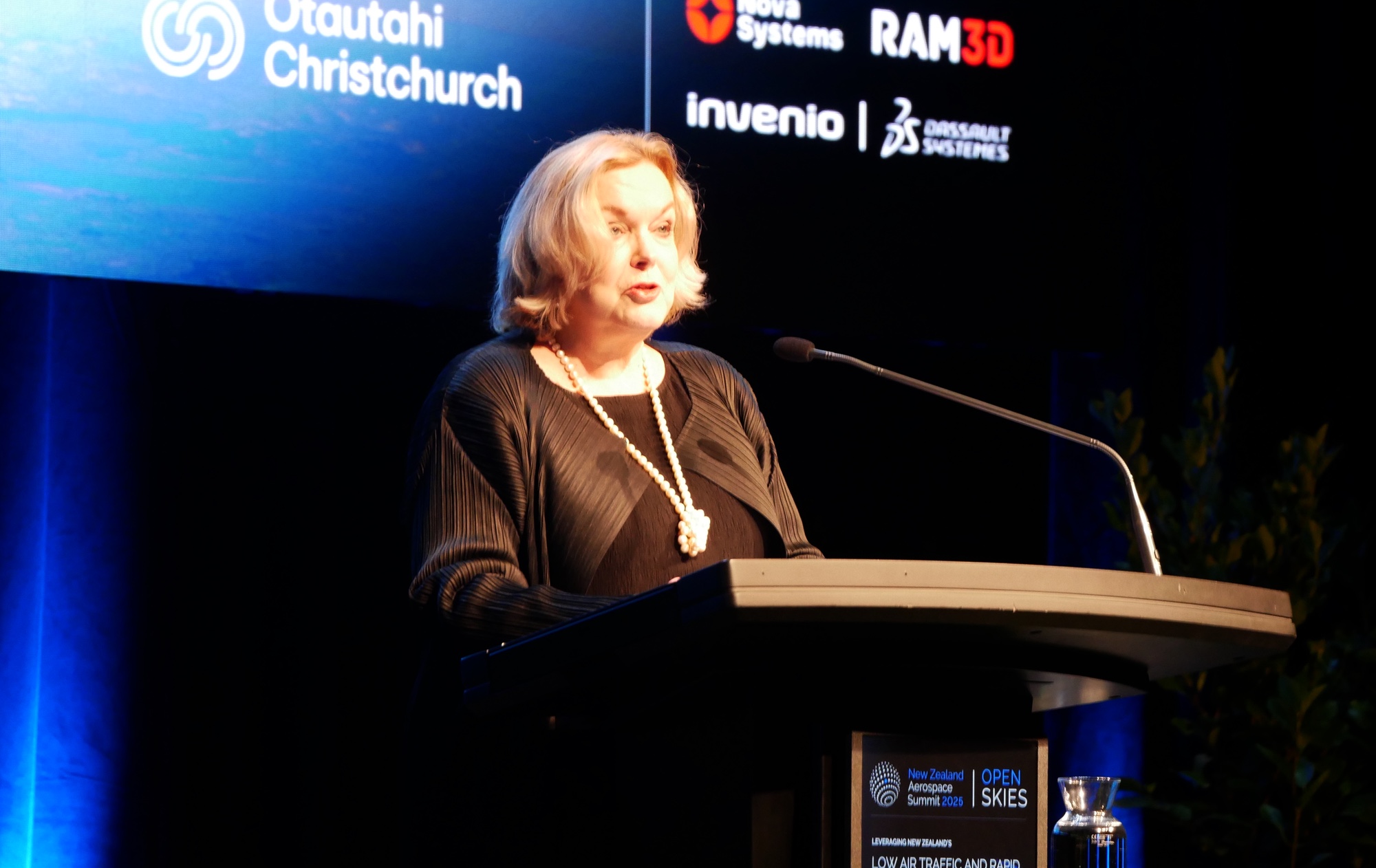Now Reading: New Zealand charts continued growth of its space industry
-
01
New Zealand charts continued growth of its space industry
New Zealand charts continued growth of its space industry


CHRISTCHURCH, New Zealand — The New Zealand government is touting the progress it is making to grow the country’s aerospace industry.
In a speech Oct. 8 at the New Zealand Aerospace Summit here, Judith Collins, the country’s space minister, said the government was making headway on goals laid out a year earlier in a space strategy that calls for doubling the size of the country’s space and advanced aviation sectors by 2030.
The country’s space sector, she noted, grew from 1.75 billion to 2.68 billion New Zealand dollars ($1.01 to $1.54 billion) from 2020 to 2024. That 53% growth rate outpaced the global growth rate of the industry of 40.6% in the same period. “It’s really good when we’re beating everyone else,” she said.
Future growth of the country’s space industry, she suggested, could be fueled by new investments in military space capabilities. “Space is no longer a niche interest but a strategic domain that underpins modern defense operations,” she said.
Collins, who is also New Zealand’s defense minister, noted space plays a role in a separate strategy released in April to modernize the country’s military, with nine billion New Zealand dollars of new funding pledged over the next four years. That would include “targeted investments” in intelligence, surveillance and reconnaissance systems; secure communications; navigation and precision targeting.
A specific plan for the defense space sector will be released in the next six months, she said. “It will set out how we will grow and sustain a space industry that supports defense capability and contributes to innovation and export opportunities,” she said,
That effort would serve one of the goals of the space strategy, which is to develop space capabilities for an unspecified “national space mission”. Other goals in the strategy include advancing regulatory reforms, increasing trade and investment, building up the country’s aerospace workforce and promoting innovation.
At the two-day conference, industry and government officials highlighted efforts that include updates to regulations for aerospace activities, such as licensing for experimental vehicles. While primarily intended to support advanced aviation activities like drones, it has also assisted Dawn Aerospace, a New Zealand company that has flown its Aurora suborbital spaceplane there.
The country’s low population density and access to relatively uncongested aerospace is a key factor for growing the industry. “We don’t have any near neighbors. We have an environment where we can have the high cadence of launches, which not many others can do,” Collins said in an interview after her speech.
The industry has a reputation for innovation, she added, that helps it stand out. “If I take someone like Peter Beck of Rocket Lab, a home-grown New Zealand engineer now responsible essentially for us being the third in the world for successful vertical launches, I reckon we have a place” in the global market, she said.
The growth is not without challenges. At the conference, industry officials cited issues like limited access to domestic capital that requires companies to look beyond New Zealand for funding beyond early-stage rounds. There is also a limited workforce trained in specific skills needed by the aerospace industry.
Collins cited in the interview initiatives to make it easier for “highly qualified” people in the space sector outside New Zealand to work in the country, as well as aerospace training programs at universities in the country. The government also recently established Invest New Zealand, an agency charged with increasing foreign investment in domestic companies.
The growth of the space industry could focus more scrutiny on it. Outside the convention center hosting the summit, dozens of protestors gathered. Flyers posted in town ahead of the conference announced plans to “blockade” the conference, although access to the event for attendees was unimpeded.
Some of the protestors focused their opposition specifically on what they perceived to be direct support for Israel in Gaza using New Zealand-supplied capabilities. Others said they were concerned that a growing New Zealand role in space could make the country a target.
Collins dismissed the protestors in the interview as the “usual suspects who turn up at every single event we do,” and said that the aerospace industry had strong public support, particularly given its growth potential.
“When they realize how big it is, what the wages are, what the opportunities are,” she said of the public’s perception of the space industry, “they’re very excited.”
Stay Informed With the Latest & Most Important News
Previous Post
Next Post
-
 01Two Black Holes Observed Circling Each Other for the First Time
01Two Black Holes Observed Circling Each Other for the First Time -
 02From Polymerization-Enabled Folding and Assembly to Chemical Evolution: Key Processes for Emergence of Functional Polymers in the Origin of Life
02From Polymerization-Enabled Folding and Assembly to Chemical Evolution: Key Processes for Emergence of Functional Polymers in the Origin of Life -
 03Astronomy 101: From the Sun and Moon to Wormholes and Warp Drive, Key Theories, Discoveries, and Facts about the Universe (The Adams 101 Series)
03Astronomy 101: From the Sun and Moon to Wormholes and Warp Drive, Key Theories, Discoveries, and Facts about the Universe (The Adams 101 Series) -
 04True Anomaly hires former York Space executive as chief operating officer
04True Anomaly hires former York Space executive as chief operating officer -
 05Φsat-2 begins science phase for AI Earth images
05Φsat-2 begins science phase for AI Earth images -
 06Hurricane forecasters are losing 3 key satellites ahead of peak storm season − a meteorologist explains why it matters
06Hurricane forecasters are losing 3 key satellites ahead of peak storm season − a meteorologist explains why it matters -
 07Binary star systems are complex astronomical objects − a new AI approach could pin down their properties quickly
07Binary star systems are complex astronomical objects − a new AI approach could pin down their properties quickly

















